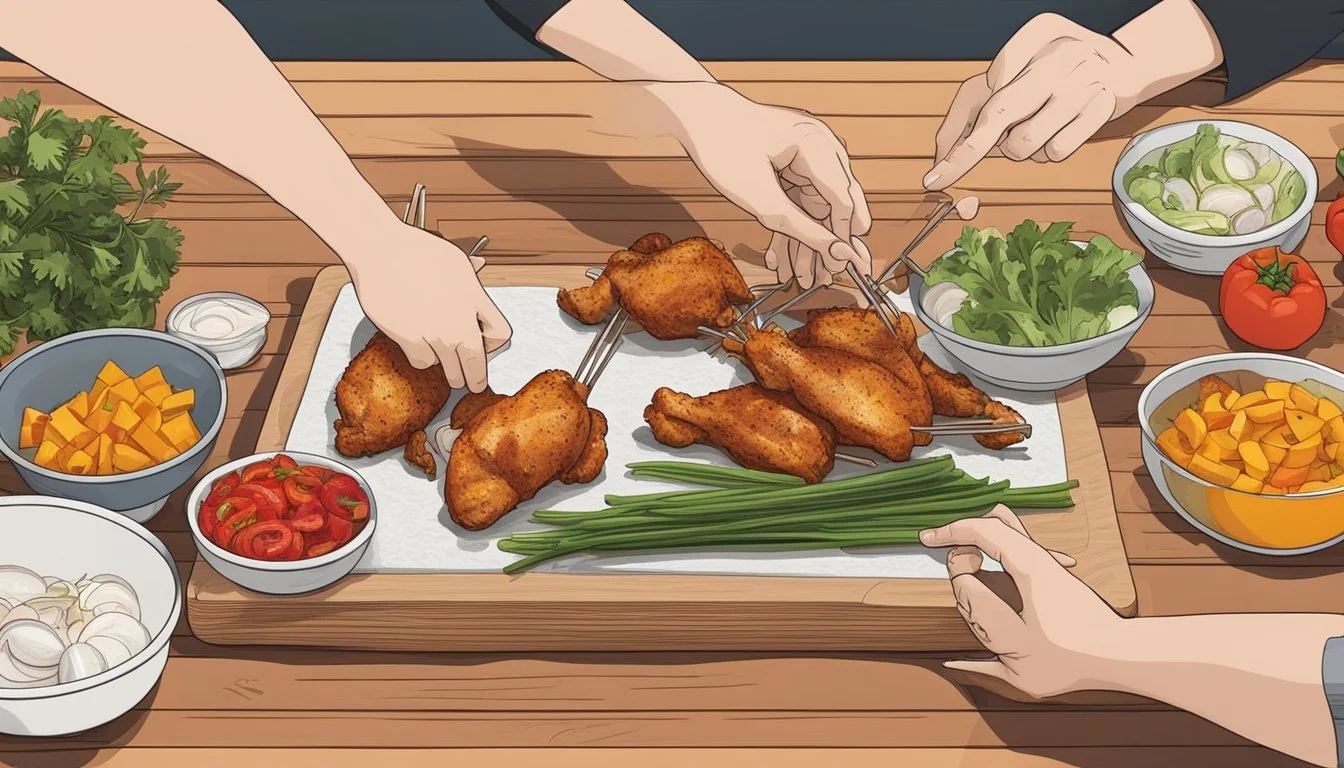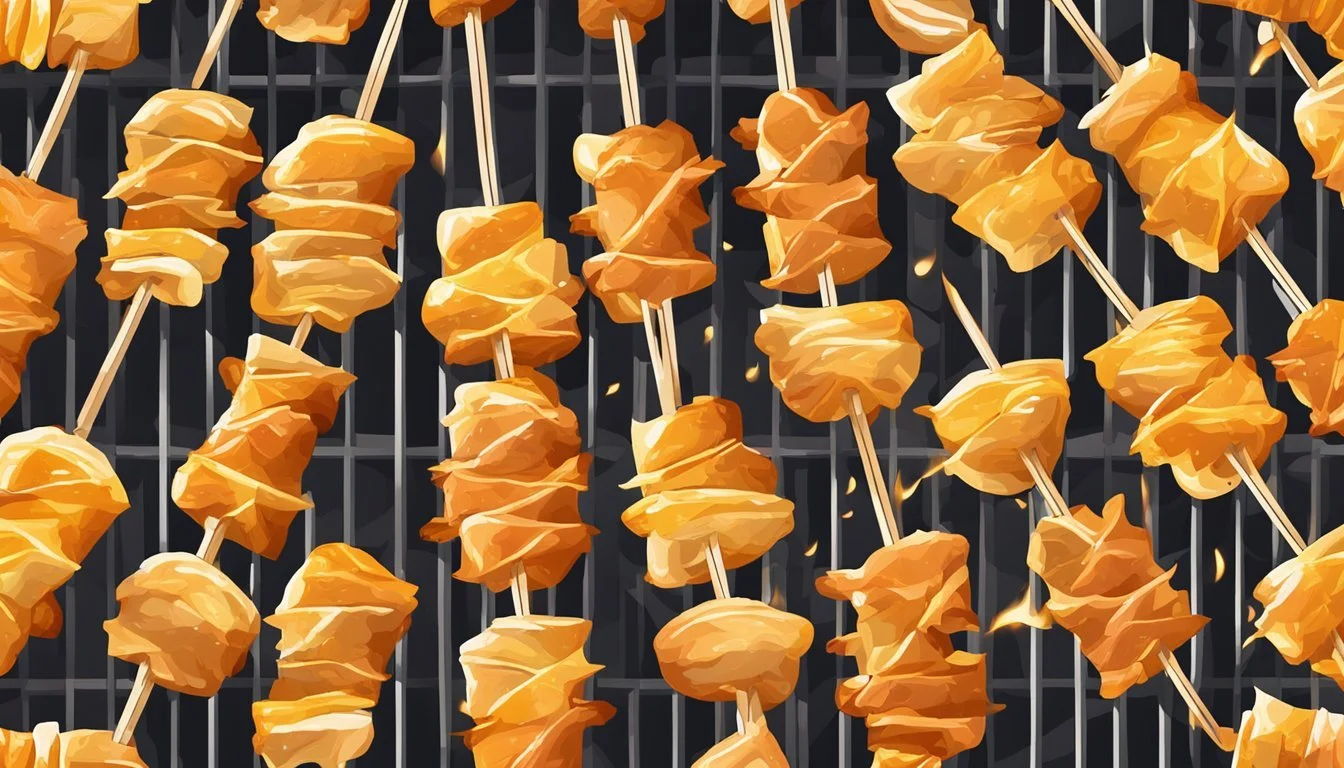How Long Do BBQ Chicken Skewers Last?
Safe Storage Tips
BBQ chicken skewers are a delightful addition to any summer gathering, offering a perfect combination of flavor and convenience. Properly stored, BBQ chicken skewers can last in the refrigerator for up to 3-4 days. This ensures you can enjoy leftovers without compromising on taste and safety.
When grilling BBQ chicken skewers, achieving the right internal temperature is crucial. Chicken should be cooked until it reaches an internal temperature of 165°F (74°C) to ensure safety and optimal juiciness. Whether you're using a grill set to medium-high or an oven preheated to 425°F (220°C), turning the skewers every few minutes helps achieve even cooking and prevents burning.
Including vegetables like bell peppers, onions, and cherry tomatoes not only enhances the taste but also adds vibrant colors to your BBQ chicken skewers. Each piece is grilled to perfection, ensuring a juicy and flavorful bite every time. Perfectly cooked and well-stored skewers can serve as a quick and easy meal solution throughout the week.
Selecting Ingredients
Choosing the right ingredients for BBQ chicken skewers is crucial for ensuring a tasty and visually appealing dish. Focus on selecting fresh chicken, vibrant vegetables, and flavorful seasonings and marinades to elevate your skewers.
Choosing the Right Chicken
Opt for boneless, skinless chicken breasts or chicken thighs. Chicken breasts offer a lean option, while thighs provide a juicier texture. Cut the chicken into even, 1-inch pieces to ensure uniform cooking. Mixing light and dark meat can add depth to the skewers.
Vegetable and Seasoning Options
Incorporate vibrant vegetables such as bell peppers, onions, and cherry tomatoes to add color and flavor. Slice vegetables into sizes similar to the chicken pieces for even grilling. Seasoning is key for enhancing flavors; use a blend of salt, black pepper, garlic powder, paprika, and thyme. These simple yet effective seasonings complement the chicken and vegetables.
Marinades and Sauces
Marinating the chicken infuses it with flavor and helps retain moisture. A basic marinade can include soy sauce, olive oil, honey, garlic, and vinegar. For a BBQ twist, mix in some ketchup, Worcestershire sauce, and brown sugar. Allow the chicken to marinate for at least 3 hours, or overnight, for best results. Use any leftover marinade for basting during grilling to add extra flavor.
Preparing Chicken Skewers
Effective preparation ensures flavorful and succulent BBQ chicken skewers. This process involves precise cutting, marinating, and careful pre-grill preparation to achieve optimal results.
Cutting and Marinating
Begin by trimming chicken breasts into even-sized cubes to promote even cooking. Uniform pieces cook more consistently, preventing some from being undercooked or overcooked.
Marinating the chicken is crucial. A mixture of oil, lemon juice, garlic, salt, and pepper can infuse flavor and tenderize the meat. Allow the chicken to marinate for at least 30 minutes, but for deeper flavor, let it sit for up to 24 hours in the refrigerator.
Skewering Techniques
Choose between wooden skewers or metal skewers. Soak wooden skewers in water for about 30 minutes to prevent burning on the grill.
Use a rotating technique, alternating chicken with vegetables such as onions, green peppers, mushrooms, or cherry tomatoes. This not only enhances flavor but also ensures even heat distribution. If desired, add grilled pineapple for a sweet touch.
Seasoning and Basting
Prior to grilling, apply a dry rub or seasoning blend to the chicken for an extra layer of flavor. Throughout the grilling process, baste the skewers with a marinade or barbecue sauce.
This helps keep the meat moist and enhances its taste. Brush with olive oil or a marinade after each flip to prevent the chicken from drying out.
Pre-Grill Preparation
Preheat the grill to medium-high, aiming for around 400-450°F. This high heat is essential for searing the chicken quickly, locking in juices, and achieving a delicious char.
Brush the grates with oil to prevent sticking. Place the skewers on the grill, and cook for approximately 10-15 minutes, turning every 2-3 minutes. Ensure the internal temperature of the chicken reaches 165°F for safe consumption.
Grilling Process
Achieving perfectly cooked barbecue chicken skewers involves managing the grill temperature, mastering cooking time and techniques, and adding finishing touches for the best flavor and texture.
Managing the Grill Temperature
Effective temperature control is crucial for juicy, evenly cooked chicken skewers. A charcoal grill requires coals to be lit until they have a consistent gray ash. For a gas grill, preheat to medium-high, around 450°F. Aim for a hot zone and a cooler zone to manage flare-ups or adjust heat as needed.
Keeping the grill temperature steady ensures even cooking. Use an instant-read thermometer to check grill heat and chicken’s internal temperature, which should reach 165°F. Adjust vents on charcoal grills or burners on gas grills to maintain the correct temperature throughout cooking.
Cooking Time and Techniques
Cooking time for chicken skewers generally ranges from 10 to 15 minutes, depending on the grill’s heat and the size of the chicken pieces. Start by arranging the skewers directly over the heat source, grilling each side for 4-5 minutes. Flip the skewers frequently to avoid burning and ensure even cooking.
Using basting techniques with a flavorful sauce during cooking helps keep the chicken moist and adds layers of flavor. Avoid basting too early to prevent burning the sauce. An instant-read thermometer is essential to verify that the chicken reaches an internal temperature of 165°F.
Finishing Touches
To finish the chicken skewers, apply a final layer of sauce during the last few minutes of grilling. This step enhances the flavor and gives the skewers a sticky, delicious glaze. Letting the skewers rest for a few minutes after removing them from the grill helps the juices redistribute, resulting in juicy chicken.
To prevent sticking, lightly oil the grill grates before placing the skewers. Serve the barbecue chicken skewers immediately after resting to enjoy them at their best. Attention to these finishing details distinguishes ordinary skewers from extraordinary ones, providing a satisfying grilling experience for any barbecue enthusiast.
Storage and Shelf Life
Properly storing and handling BBQ chicken skewers ensures food safety and maximizes the shelf life of your leftovers. This guide covers refrigeration, freezing, reheating, and signs of spoilage.
Refrigeration and Freezing
Refrigeration: Cooked BBQ chicken skewers should be cooled and stored in airtight containers or tightly wrapped in aluminum foil or plastic wrap. They can be safely stored in the refrigerator for up to 3-4 days.
Freezing: For longer storage, freeze the skewers. Place them in freezer-safe containers or heavy-duty freezer bags. Frozen chicken skewers maintain quality for about 2-3 months. Label the containers with the date for easy tracking. Ensure the skewers are cooled completely before freezing to maintain texture and flavor.
Reheating Leftovers
Oven: Preheat to 300-325°F. Place the chicken skewers on a baking sheet, cover lightly with foil to retain moisture, and heat for 15-20 minutes or until warm throughout.
Air Fryer: Set the air fryer to 350°F. Place the skewers in a single layer and reheat for 5-7 minutes, checking for even heating. Stir or flip them halfway through for best results.
Microwave: Heat on medium power for 2-3 minutes, turning halfway. Be cautious, as microwaving can sometimes cause meat to become dry or rubbery.
Signs of Spoilage
Visual: Look for any changes in color. Fresh chicken should be a consistent color, but if it develops greyish or greenish hues, it’s likely spoiled.
Smell: Spoiled chicken emits a sour or rancid odor. If the smell is off or pungent, discard the skewers immediately.
Texture: Slimy or sticky surfaces indicate bacterial growth. If the chicken feels slimy to the touch, it’s unsafe to eat.
Maximizing Freshness
To keep BBQ chicken skewers fresh:
Use Clean Utensils: Avoid cross-contamination by using clean utensils when handling leftovers.
Prompt Storage: Refrigerate or freeze the skewers within 2 hours of cooking.
Avoid Frequent Temperature Changes: Store in smaller portions to reheat only what you need, reducing the risk of temperature fluctuations which can promote bacterial growth.
Keeping these tips in mind not only ensures safety but also enhances the taste and quality of your BBQ chicken skewers.
Health and Safety Considerations
Ensuring food safety when preparing and storing BBQ chicken skewers is crucial. This includes cooking to the correct internal temperature, preventing cross-contamination, addressing dietary restrictions, and using proper tools like instant-read thermometers.
Safe Cooking Temperatures
Chicken must be cooked thoroughly to prevent harmful bacteria. The USDA recommends cooking chicken to an internal temperature of 165°F (74°C).
Using an instant-read thermometer ensures accuracy. Insert it into the thickest part of the chicken without touching the bone to get a precise reading. Properly cooked chicken will appear white with clear juices, rather than pink or bloody.
Preventing Contamination
Handling raw chicken requires care to avoid spreading bacteria like Salmonella. Keep raw chicken and other ingredients separate using different cutting boards.
Sanitize surfaces and utensils that come into contact with raw chicken. Wash hands thoroughly with soap and water before and after handling raw meat. When grilling chicken skewers, avoid placing them on the same plate that held raw chicken.
Allergies and Dietary Restrictions
Be mindful of common allergens like soy, nuts, and gluten used in marinades and sauces. Inform guests with allergies of any potential allergens in the ingredients.
Consider offering alternative options such as gluten-free marinades or vegetable-based skewers for those with dietary restrictions. Clearly label food items to help guests identify safe options, especially in a group setting.
Using an Instant-Read Thermometer
An instant-read thermometer is a vital tool for grilling chicken skewers. It ensures that the internal temperature reaches a safe level.
Place the thermometer in the center of the thickest piece of chicken for an accurate reading. Avoid touching the bone, which can give a false reading. Use this tool to regularly check the temperature, especially when cooking for a large group.
Serving Suggestions
BBQ chicken skewers can be elevated with the right sauces, side dishes, and presentation. The following tips will help make your chicken kabobs both delicious and visually appealing.
Accompanying Sauces and Condiments
Pair BBQ chicken skewers with a variety of sauces to enhance their flavorful appeal. BBQ sauce is a classic choice, adding a sweet and smoky dimension. Yogurt-based sauces like tzatziki offer a refreshing contrast. For a spicy kick, consider serving with sriracha or a spicy aioli. Include a tangy chimichurri sauce for a burst of herbal freshness. Offer multiple options to cater to different palates.
Side Dish Pairings
Side dishes should complement the flavors of the grilled BBQ chicken. Grilled vegetables like zucchini, bell peppers, and onions are excellent choices. Rice pilaf or couscous presents a light and fluffy base that pairs well with marinated chicken. Corn on the cob brings a touch of sweetness and summer flair. For a refreshing touch, serve with garden salads or coleslaw. These sides enhance the overall meal without overshadowing the chicken skewers.
Presentation Tips
Present BBQ chicken skewers in a way that accentuates their appeal. Lay them out on a large platter, alternating with colorful vegetables to create a visually appealing display. Use a garnish of fresh herbs like parsley or cilantro for added color. Serve sauces in small bowls around the platter for easy access. Ensure skewers are evenly spaced, making them easy to grab. This thoughtful presentation elevates the dining experience.






